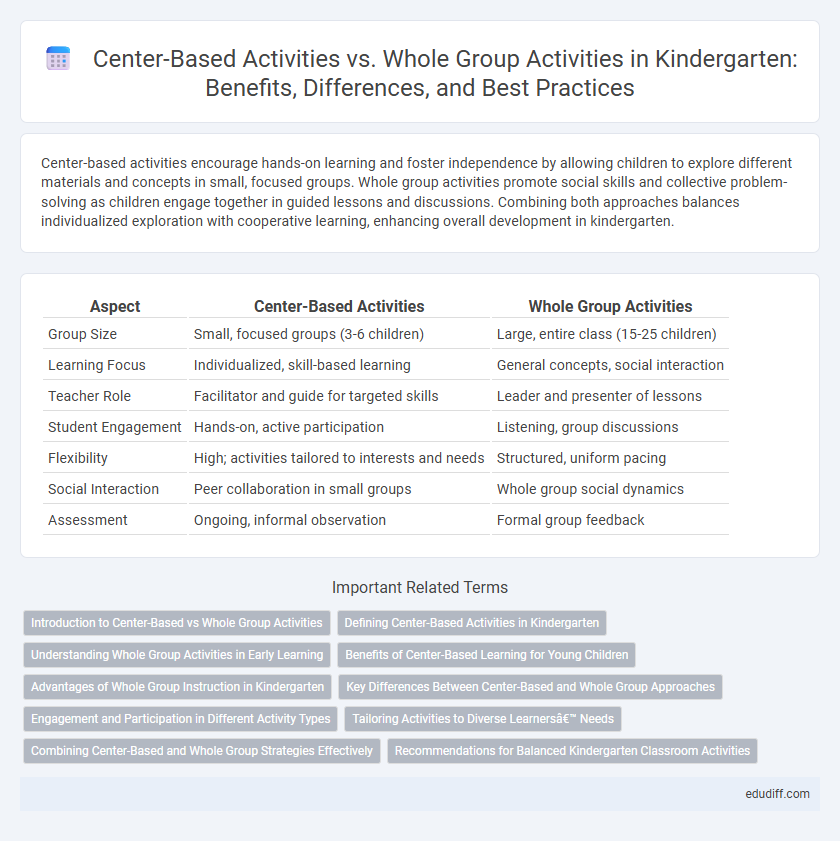Center-based activities encourage hands-on learning and foster independence by allowing children to explore different materials and concepts in small, focused groups. Whole group activities promote social skills and collective problem-solving as children engage together in guided lessons and discussions. Combining both approaches balances individualized exploration with cooperative learning, enhancing overall development in kindergarten.
Table of Comparison
| Aspect | Center-Based Activities | Whole Group Activities |
|---|---|---|
| Group Size | Small, focused groups (3-6 children) | Large, entire class (15-25 children) |
| Learning Focus | Individualized, skill-based learning | General concepts, social interaction |
| Teacher Role | Facilitator and guide for targeted skills | Leader and presenter of lessons |
| Student Engagement | Hands-on, active participation | Listening, group discussions |
| Flexibility | High; activities tailored to interests and needs | Structured, uniform pacing |
| Social Interaction | Peer collaboration in small groups | Whole group social dynamics |
| Assessment | Ongoing, informal observation | Formal group feedback |
Introduction to Center-Based vs Whole Group Activities
Center-based activities in kindergarten emphasize small group or individual learning stations tailored to specific skills, promoting hands-on exploration and personalized interaction. Whole group activities involve the entire class engaging in teacher-led instruction, fostering social skills and collective participation. Both approaches support diverse learning needs and enhance early childhood development through complementary teaching strategies.
Defining Center-Based Activities in Kindergarten
Center-based activities in kindergarten refer to structured learning experiences designed around specific interest areas or skills, where children engage in hands-on tasks at different stations or centers within the classroom. These activities promote individualized learning, allowing children to explore concepts like math, literacy, science, and art through interactive materials and play. Center-based activities support differentiated instruction by catering to varied developmental levels and encourage social interaction in small groups.
Understanding Whole Group Activities in Early Learning
Whole group activities in early learning foster social skills, communication, and cooperative play by engaging all children simultaneously in a shared experience. These activities promote a sense of community and help develop listening, turn-taking, and collective problem-solving abilities. Center-based activities complement whole group sessions by allowing focused, hands-on exploration tailored to individual interests and developmental levels.
Benefits of Center-Based Learning for Young Children
Center-based activities in kindergarten promote hands-on, individualized learning experiences that enhance fine motor skills and encourage independence. These activities allow children to explore distinct learning stations, fostering creativity and critical thinking in a low-pressure environment. Research shows that center-based learning supports social development by enabling cooperative play and peer interaction within small groups.
Advantages of Whole Group Instruction in Kindergarten
Whole group instruction in kindergarten fosters a cohesive learning environment that enhances social skills and ensures consistent delivery of curriculum content to all students simultaneously. This approach promotes active engagement through shared experiences, facilitating collaborative learning and peer interaction essential for early childhood development. Teachers can efficiently manage classroom dynamics and tailor instruction to meet diverse learning needs within a unified setting, optimizing educational outcomes.
Key Differences Between Center-Based and Whole Group Approaches
Center-based activities in kindergarten emphasize hands-on, student-centered learning with smaller groups engaging in focused tasks that promote independence, creativity, and social skills. Whole group activities involve the entire class participating in structured lessons led by the teacher, fostering collective discussion, direct instruction, and shared experiences. The key difference lies in the interaction dynamic: center-based approaches support individualized exploration, while whole group approaches prioritize uniform teaching and group cohesion.
Engagement and Participation in Different Activity Types
Center-based activities in kindergarten foster higher engagement and individualized participation by allowing children to explore various materials and tasks at their own pace, promoting hands-on learning and creativity. Whole group activities encourage social interaction and collaborative skills, but may limit active involvement for some children due to the structured format and teacher-led pace. Research shows that a balanced mix of center-based and whole group activities maximizes active participation, supporting diverse learning styles and sustained attention in early childhood education.
Tailoring Activities to Diverse Learners’ Needs
Center-based activities in kindergarten provide tailored learning experiences by allowing children to engage in hands-on, differentiated tasks that cater to varied developmental levels and interests. Whole group activities promote social interaction and collective learning but may require strategic modifications to accommodate diverse learners' needs effectively. Balancing both approaches ensures inclusivity, fostering individualized growth while maintaining a cohesive classroom environment.
Combining Center-Based and Whole Group Strategies Effectively
Combining center-based and whole group activities in kindergarten enhances student engagement by balancing individualized learning with collective instruction, fostering social skills alongside academic development. Center-based activities promote hands-on exploration and differentiated learning opportunities, while whole group sessions support shared knowledge, communication, and classroom cohesion. Effective integration involves scheduling alternating periods and aligning activities with learning goals to maximize participation and retention across diverse student needs.
Recommendations for Balanced Kindergarten Classroom Activities
Center-based activities in kindergarten foster individualized learning and hands-on exploration, promoting cognitive and social development through targeted tasks like sensory play and art stations. Whole group activities enhance social skills, language development, and cooperative learning by engaging all students in shared experiences such as storytime and group discussions. A balanced kindergarten classroom integrates both approaches, ensuring diverse learning styles are met and supporting holistic growth by alternating focused centers with inclusive group lessons.
Center-based activities vs Whole group activities Infographic

 edudiff.com
edudiff.com